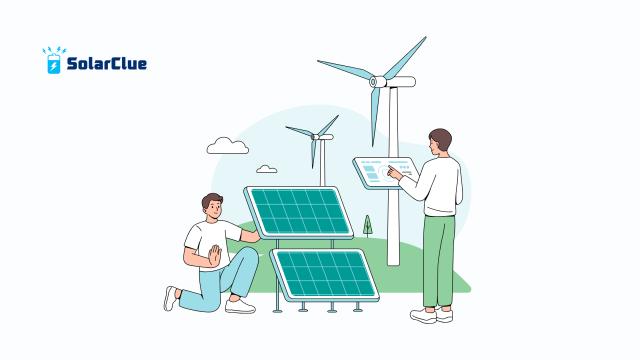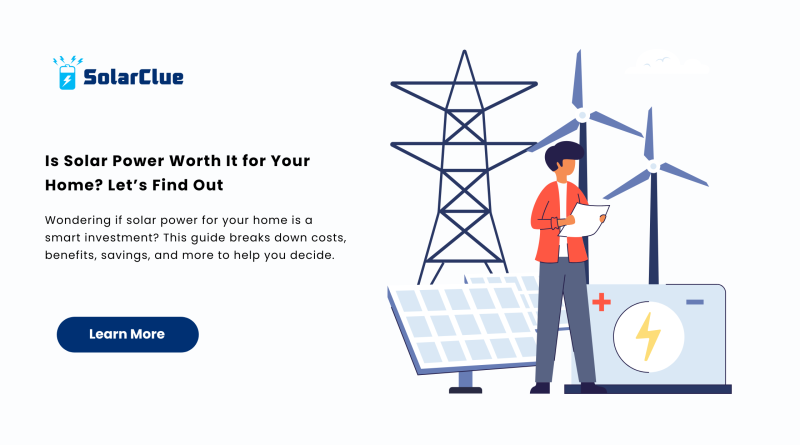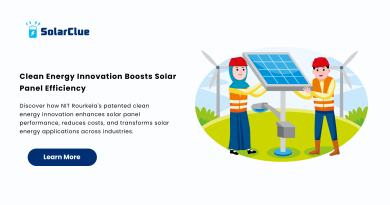Is Solar Power Worth It for Your Home? Let’s Find Out
With electricity bills soaring and environmental concerns growing, many homeowners are asking the same question: Is solar power for your home worth it? Whether you’re looking to cut costs, reduce your carbon footprint, or gain energy independence, this blog will help you make a confident, well-informed decision. Let’s break it down.
Table of Contents
- 1 What is Solar Power and How Does It Work?
- 2 Understanding a Solar Power System for Home Use
- 3 Is Solar Power for Your Home Worth the Investment?
- 4 Environmental Benefits of Solar Power for Home
- 5 Is Your Home Suitable for Solar?
- 6 Maintenance and Lifespan
- 7 Pros and Cons of Solar Power for Your Home
- 8 Real-Life Example
- 9 When Is Solar Power Not Ideal?
- 10 FAQs
What is Solar Power and How Does It Work?
Solar power is the energy harnessed from sunlight using photovoltaic (PV) cells in solar panels. These panels convert sunlight into direct current (DC), which is then transformed into usable alternating current (AC) by an inverter. The resulting electricity can be used immediately, stored in a battery, or sent back to the grid.
Understanding a Solar Power System for Home Use
A typical solar power system for home includes:
-
Solar Panels: To capture sunlight and generate electricity
-
Inverter: To convert DC to AC power
-
Mounting Structure: To hold the panels in place on your roof or ground
-
Battery (optional): To store unused energy for backup
-
Net Meter: To measure power consumed and sent to the grid
These components work together to deliver clean energy to your home every day.
Is Solar Power for Your Home Worth the Investment?
Let’s evaluate it from different angles:
1. Cost and Payback Period
The upfront cost of a solar power system ranges from ₹60,000 to ₹80,000 per kW in India, including installation. A typical 3kW setup would cost around ₹2 lakhs to ₹2.5 lakhs. However, with government subsidies, you can reduce the initial investment by up to 40%.
The payback period is typically 4–6 years, depending on your location, electricity usage, and panel efficiency. After that, the energy you generate is essentially free.
2. Savings on Electricity Bills
This is where solar power for home really shines. If you pay ₹2,000–₹5,000 monthly for electricity, solar can reduce that by 80% or even eliminate it entirely if your system is optimally designed.
Over a 25-year panel lifespan, that’s a potential savings of ₹10–15 lakhs!
3. Government Incentives and Net Metering
Central and state governments offer:
-
Subsidies up to 40% on the benchmark cost for rooftop systems
-
Net metering benefits, where excess power is fed back to the grid and credited to your bill
-
GST exemptions and loans under solar schemes
This makes solar power for your home even more appealing financially.
Environmental Benefits of Solar Power for Home
Solar energy is a green, renewable resource. A typical home installation can:
-
Offset 3–4 tons of CO₂ annually
-
Reduce your reliance on fossil fuels
-
Help fight climate change
So, by choosing solar power, you’re contributing to a healthier planet.
Is Your Home Suitable for Solar?
Before installation, consider these factors:
Roof Space and Orientation
You need a shadow-free area with enough space (approx. 100 sq. ft. per kW). South-facing roofs are ideal in India for maximum sunlight exposure.
Local Weather Conditions
More sunshine = more energy. Solar works even on cloudy days, but optimum performance is during clear, sunny weather.
Load Requirements
Calculate your average monthly energy usage. This will help you decide the size of the solar power system you need.
Maintenance and Lifespan
Solar panels require minimal maintenance—just occasional cleaning and annual checks. Most panels come with a 25-year performance warranty, while inverters usually last 8–10 years.
Routine maintenance ensures your system works efficiently and lasts long.
Pros and Cons of Solar Power for Your Home

✅ Pros
-
Long-term savings on electricity bills
-
Government subsidies and incentives
-
Increases property value
-
Eco-friendly and sustainable
-
Low maintenance
❌ Cons
-
High upfront cost (though decreasing)
-
Dependent on roof condition and sunlight
-
Battery storage (if needed) increases cost
Despite some limitations, the pros outweigh the cons for most homeowners.
Real-Life Example
Rahul, a resident of Jaipur, installed a 5kW system in 2021. His electricity bill dropped from ₹4,500/month to ₹500. In just 5 years, he’ll recover his investment and continue saving for two more decades.
When Is Solar Power Not Ideal?
-
If your roof is shaded or too small
-
If you frequently shift houses
-
If initial budget is a constraint without access to financing or subsidies
But even then, smaller systems or community solar programs may still offer partial benefits.
We’ve seen how solar power for your home offers financial, environmental, and long-term benefits. It is more than just a trend—it’s a shift toward sustainable living.
FAQs
Q1: How much does solar power cost for a typical Indian home?
A 3kW–5kW system costs around ₹ 2–3.5 lakhs before subsidies.
Q2: Can I completely eliminate my electricity bill?
Yes, if your system is sized correctly and net metering is available.
Q3: How long does a solar power system last?
Solar panels last up to 25 years; inverters may need replacement in 8–10 years.
Q4: What if there’s no sunlight for a few days?
You’ll rely on the grid or stored battery power during low sunshine periods.
Q5: Is solar power worth it in cloudy areas?
Yes, though production may be lower, it still offers savings and sustainability benefits.
So, is solar power worth it for your home? If you’re looking to save money, reduce emissions, and invest in your future, the answer is a big yes. Want to explore the best options and pricing? Discover a wide range of solar products at solarclue.com and get expert guidance on our blog at blog.solarclue.com—because your sustainable journey starts here.




